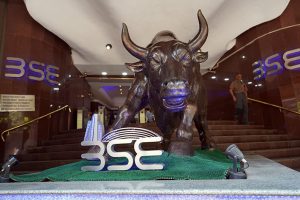Asia’s major stock indexes saw a mixed day of trading on Wednesday with US interest rates, conflict in the Middle East, regulatory policy moves and profit-booking all having an impact on trading.
Shares in some corners steadied after a recent sell-off although many investors remain wary after the world’s most powerful central banker had a change of heart on rate cuts this year, pushing Treasury yields to new five-month highs.
Japan’s Nikkei share average was on track for a third consecutive day of losses, as tensions in the Middle East continued to weigh on sentiment and investors banked profits before Japan’s earnings season kicks into high gear.
Also on AF: China’s Theft of Trade Secrets Our No1 Concern: US Patent Chief
Although the benchmark index started the day in positive territory, rebounding from Tuesday’s eight-week low, caution quickly took hold. The Nikkei share average fell 1.32%, or 509.40 points, to close at 37,961.80, while the broader Topix was down 1.26%, or 33.96 points, to 2,663.15.
Chinese stocks rose, however, as the nation’s top securities regulator clarified its new delisting rules to calm the market panic following a sell-off in small-cap shares. Hong Kong stocks edged up.
Meanwhile, UBS upgraded its 2024 real GDP China growth forecast to 4.9% from 4.6% on Wednesday, due to the better first-quarter economic data and stronger export outlook.
China’s blue-chip CSI300 index was up 1.55%, with its financial sector sub-index higher by 0.74% early on, the consumer staples sector down 0.13%, the real estate index up 1.15% and the healthcare sub-index up 1.18%.
The Shanghai Composite Index rose 2.14%, or 64.31 points, to 3,071.38, while the Shenzhen Composite Index on China’s second exchange rallied 3.80%, or 62.31 points, to 1,700.75.
Chinese H-shares listed in Hong Kong rose 0.02% to 5,744.75, while the Hang Seng Index was flat, edging up 0.02%, or 2.87 points, to 16,251.84.
Elsewhere across the region, in earlier trade, Seoul was down but Sydney, Singapore, Wellington, Taipei and Manila rose. MSCI’s broadest index of Asia-Pacific shares outside Japan rose 0.1%, after plunging more than 4% in the past three sessions.
Europe was set for a subdued open, with Eurostoxx 50 futures flat on the day. US stock futures slipped 0.1% after Wall Street finished the day just ahead.
The dollar’s surprising resilience this year is causing discomfort in Asia’s currency markets. The beleaguered yen is plumbing fresh 34-year lows on an almost daily basis, the Chinese yuan is pinned near five-month troughs and Vietnam’s dong is at record lows.
Treasuries at Five-Month Highs
Meanwhile, Fed Chair Jerome Powell said recent inflation data, with three months of upside surprises, had not given policymakers enough confidence to ease policy soon. He noted the central bank may need to keep rates higher for longer than previously thought.
Markets have already slashed the amount of easing expected this year to fewer than two rate cuts, a sea change from about six cuts predicted at the beginning of the year. The first rate cut is still expected in September, although the market’s confidence in that has declined.
Two-year Treasury yields retested 5% overnight and were last at 4.9855%, while 10-years held near a five-month high at 4.6655% on diminishing expectations of Federal Reserve policy easing this year.
The International Monetary Fund said on Tuesday the global economy is set for another year of slow but steady growth, with US strength pushing world output through headwinds from lingering high inflation, weak demand in China and Europe and spillovers from two regional wars.
Geopolitical tensions in the Middle East are still running high. Israel vowed to respond to Iran’s weekend attack despite international calls for restraint, although its war cabinet put off a meeting to decide on its response until Wednesday.
Asian bonds extended the sell-off in Treasuries. The 10-year Australian government bond yield rose 5 basis points to 4.371%, the highest this year.
In commodities, oil prices slipped as demand concerns outweighed heightened tension in the Middle East. Brent futures fell 0.5% to $89.53 a barrel, while US crude dropped 0.7% to $84.81 a barrel.
Gold prices eased 0.2% to $2,376.79 per ounce, slipping away from a record high of $2,431.29.
Key figures
Tokyo – Nikkei 225 < DOWN 1.32% at 37,961.80 (close)
Hong Kong – Hang Seng Index > UP 0.02% at 16,251.84 (close)
Shanghai – Composite > UP 2.14% at 3,071.38 (close)
London – FTSE 100 > UP 0.48% at 7,858.23 (0933 BST)
New York – Dow > UP 0.17% at 37,798.97 (Tuesday close)
- Reuters with additional editing by Sean O’Meara
Read more:
US Reviewing Trade Sanctions to Tackle China Supply Chain Threats
China Sees Surprising GDP Growth, But Weak Demand in March
Nikkei, Hang Seng Slide as US Data Dashes Rate Hopes
Nikkei, Hang Seng Dip on Israel-Iran Fears, China Stocks Gain






















